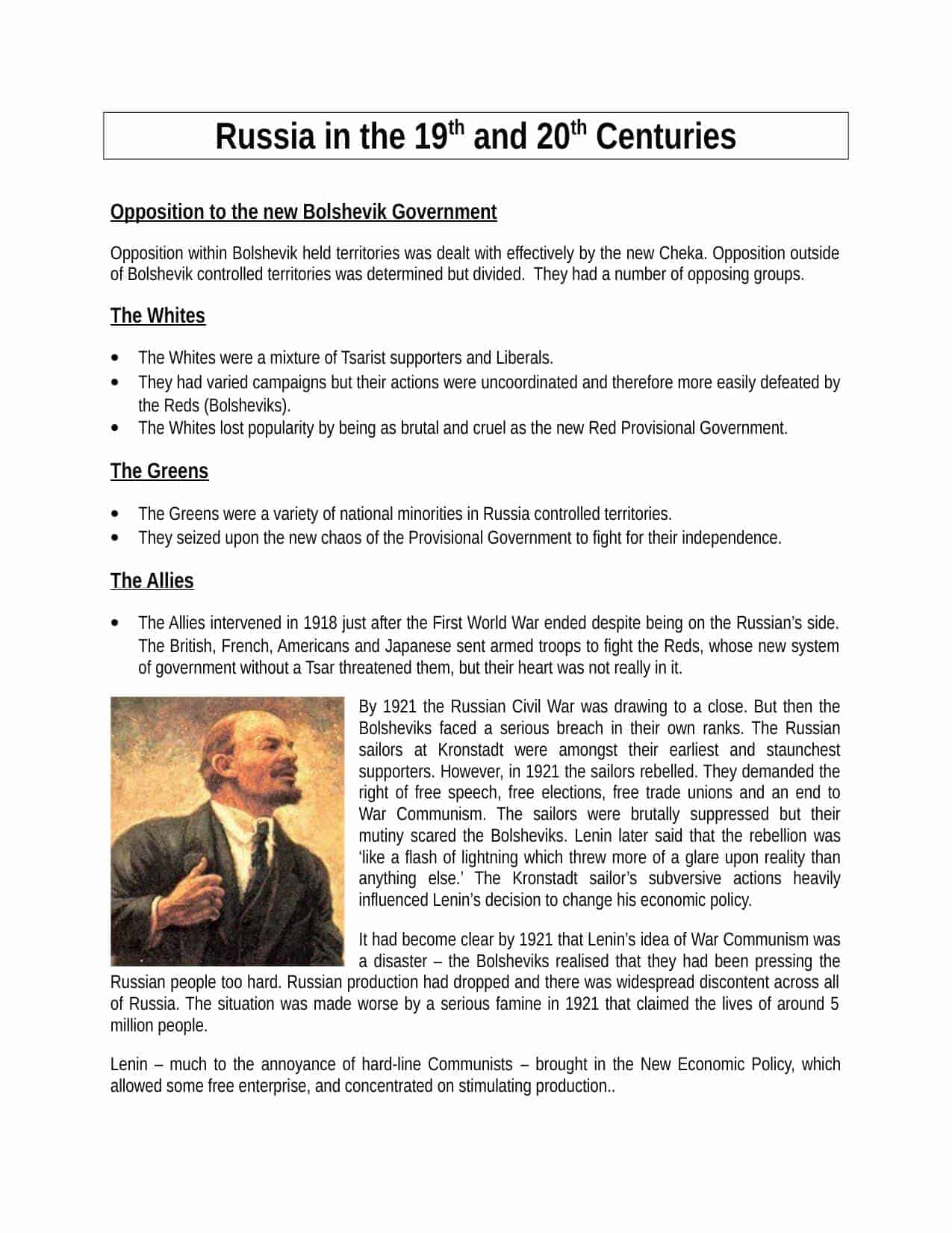Download Opposition to Bolsheviks
Click the button below to download this worksheet for use in the classroom or at home.
Download →
Lesson Snapshot
Opposition to the new Bolshevik Government
Opposition within Bolshevik held territories was dealt with effectively by the new Cheka. Opposition outside of Bolshevik controlled territories was determined but divided. They had a number of opposing groups.
The Whites
• The Whites were a mixture of Tsarist supporters and Liberals.
• They had varied campaigns but their actions were uncoordinated and therefore more easily defeated by the Reds (Bolsheviks).
• The Whites lost popularity by being as brutal and cruel as the new Red Provisional Government.
The Greens
• The Greens were a variety of national minorities in Russia controlled territories.
• They seized upon the new chaos of the Provisional Government to fight for their independence.
The Allies
• The Allies intervened in 1918 just after the First World War ended despite being on the Russian’s side. The British, French, Americans and Japanese sent armed troops to fight the Reds, whose new system of government without a Tsar threatened them, but their heart was not really in it.
By 1921 the Russian Civil War was drawing to a close. But then the Bolsheviks faced a serious breach in their own ranks. The Russian sailors at Kronstadt were amongst their earliest and staunchest supporters. However, in 1921 the sailors rebelled. They demanded the right of free speech, free elections, free trade unions and an end to War Communism. The sailors were brutally suppressed but their mutiny scared the Bolsheviks. Lenin later said that the rebellion was ‘like a flash of lightning which threw more of a glare upon reality than anything else.’ The Kronstadt sailor’s subversive actions heavily influenced Lenin’s decision to change his economic policy.
It had become clear by 1921 that Lenin’s idea of War Communism was a disaster – the Bolsheviks realised that they had been pressing the Russian people too hard. Russian production had dropped and there was widespread discontent across all of Russia. The situation was made worse by a serious famine in 1921 that claimed the lives of around 5 million people.
Lenin – much to the annoyance of hard-line Communists – brought in the New Economic Policy, which allowed some free enterprise, and concentrated on stimulating production..
The New Economic Policy
National freedoms
• Lenin allowed new freedom to national and Muslim cultures.
• In the Ukraine, although the Bolsheviks were still in power, the Ukrainian language was now used in government and for business, and children were taught it in schools.
• In the Muslim areas of central Asia (such as Uzbekistan and Turkmenistan) national bazaars were allowed to reopen, mosques were taken back from Soviet control, the Koran was restored, and native languages were encouraged.
Experts
• Coal, iron, steel and railways remained nationalised, but the Bolsheviks brought in experts, on high wages, to increase production.
Private enterprise
• Small factories were handed back to their owners – no longer nationalised.
• New traders (called ‘nepmen’) were allowed to set up small private businesses.
• At the same time – where War Communism had previously forced the peasants to hand over ALL of their surplus grain – Lenin let them sell their surplus, and pay a tax instead. Some hard-working peasants became rich (the ‘Kulaks’).
Results
1. Some of the new Politburo (the inner cabinet of the Russian government) opposed the New Economic Plan because it allowed capitalism in Russia.
2. However, the New Economic Plan did something to restore Russian prosperity – although production levels only passed the 1914 level in 1928 – making Russia far behind the rest of the Great Powers.
Lesson Plan Worksheet:
- Aimed at Students studying across UK Year 7,8 & 9 or equivalent
- Premium resource
- Use as you wish in the classroom or home environment
- Structured lesson worksheet on Opposition to the new Bolshevik Government
